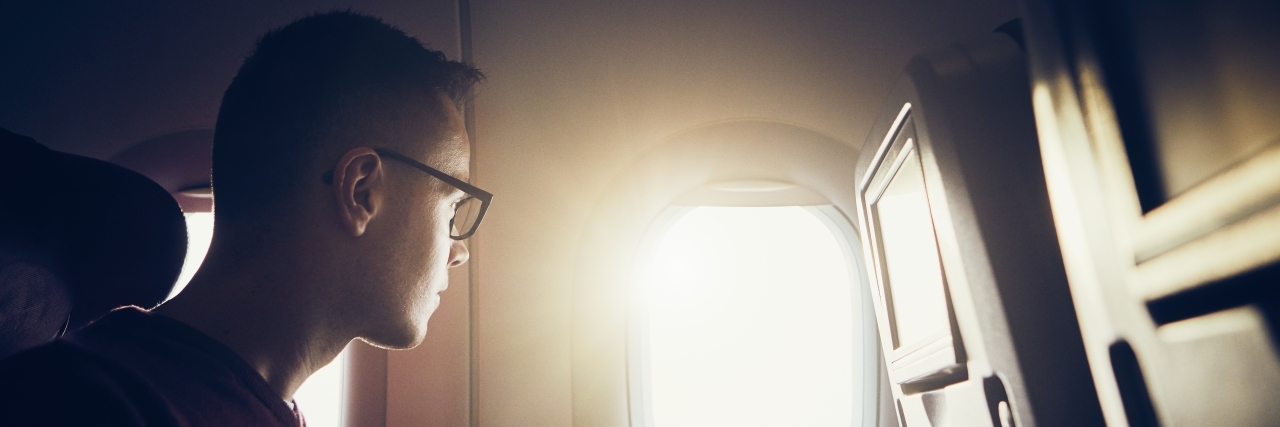What a Flight Attendant's Speech Made Me Realize About My Mental Health
Editor's Note
If you struggle with self-harm or experience suicidal thoughts, the following post could be potentially triggering. You can contact the Crisis Text Line by texting “START” to 741741. For a list of ways to cope with self-harm urges, visit this resource.
Any medical information included is based on a personal experience. For questions or concerns regarding health, please consult a doctor or medical professional.
Please see a doctor before starting or stopping a medication.
I recently went back home for Thanksgiving, and it required me to fly. After boarding the flight and the plane had pulled away from the gate, the flight attendants began their safety presentation. I’d flown enough that I knew the basics: life vests under the seats, nearest exit may be behind you, keep your buckle on when the light is on. As I was listening to music and watching the plane move toward the runway, I heard over my headphones another very well-known part of the safety presentation:
“In the event the cabin loses pressure, oxygen masks will drop down. Secure your own mask before assisting others.”
I had heard this phrase many times and never gave it another thought. But with the season of life I was in during that moment, I considered it more than usual. My mental health had been failing, rather rapidly, and I was in trouble. I needed help, and I was trying to get it, but I feared it wasn’t working fast enough. But regardless of my own challenges, I kept myself as a resource to others in their own mental health struggles.
Many of my friends and acquaintances know me as the “mentally ill kid.” I wear this with pride, I am not ashamed of my past actions or my diagnosis as someone with bipolar disorder. I make my story well-known so others can know they can reach out to me and find a kindred spirit, someone who may not share their exact story, but can empathize a bit with at least some of it. I pour myself out for others because I know what it is like to be in their shoes.
Let me be clear: I don’t have a “savior complex” (at least I don’t think I do). I’ve just been through so much in my life, and I know how terrible it can be, that I want to do whatever I can to help others not experience it. Whether that means talking openly about my medications and therapy, or showing someone my self-injury scars, I will do whatever it takes to help those who come to me. But on that plane, this question popped into my head: had I secured my own “mask” before helping others?
Was I making sure I was stable (at least stable enough) before helping others reach recovery and remission? Was I taking care of myself as I would take care of other people? Was I focusing on myself as well as those around me?
The answer was no.
No, I had not secured my own “mask,” and yet I was still walking around the whole plane trying to help everyone else. I was losing air trying to help others breathe. What good is it to help people in the short-term only to crumble and fall, making it impossible to be helpful in the long-term? How could I continue to pour myself out when my cup was empty?
Why did I do this? Why was I so willing to help other people at my own expense? At first I thought it was just my desire to be a good person, but that wasn’t it. The real reason was much more discouraging. I wanted to help others because I saw value in them, I saw they deserved help to allow them to live their best lives. I did not see that in myself. I did not look in the mirror and see the same value and worth I saw in the stranger on the bus. I did not believe I was worthy of the same kind of life I wanted for those around me. I had accepted my purpose in life was to forget about myself and focus solely on other people.
These thoughts, feelings and mentalities remain with me now, but recognizing them has helped me learn a very important lesson: I cannot help the person next to me if I am not well enough to sit next to them in the first place. I cannot afford to ignore myself any longer. To this day, I still struggle to believe this, but I need to embrace the idea I am worthy of the life I want to help others have.
I would be willing to bet I am not alone in this. You very well can probably relate to this story. A story of selflessness, a story of dedication to helping others in journeys similar to your own, all while risking your own mental health. Or perhaps even just the story of struggling to see yourself as valuable, beautiful and worthy of life.
If you can relate to this story even a little bit, I hope you take away the same lessons I am trying to: you are a valuable person, a person worthy of the life you want. I know you want to help other people, it’s a noble cause. But you cannot do that if you allow yourself to fade away because you did not take care of yourself. Please secure your own mind before assisting others.

